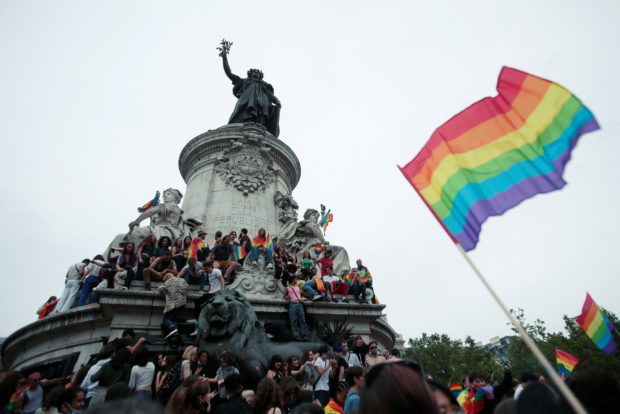French dictionary sparks debate with non-binary ‘iel’ pronoun

FILE PHOTO: Participants holding rainbow flags and placards sit on a monument during the traditional LGBTQ Pride march, amid the coronavirus disease (COVID-19) outbreak, on the Republic Square in Paris, France June 26, 2021. REUTERS/Sarah Meyssonnier
PARIS — French dictionary Le Robert has added the “iel” pronoun for non-binary people to its online edition, sparking heated debate in a country where grammar is sacrosanct.
Le Robert, one of France’s leading dictionaries, said in a statement on Wednesday that a few weeks ago it added the “iel” pronoun to its list of words after its researchers noticed growing usage of the pronoun in recent months.
In English, the gender-neutral “they” has been in use for some years by people who do not identify as male or female. Many public figures – including U.S. Vice President Kamala Harris – specify “she/her” or “he/his” as their preferred pronoun in Twitter profiles, email signoffs, or CVs to show solidarity with non-binary people.
Le Robert’s move has sparked heated debate in the French press and on social media, with several politicians taking issue with the term.
The French government is squarely against the idea, and the Education Ministry has resisted earlier attempts at incorporating inclusive language in the school curriculum.
Article continues after this advertisement“Inclusive writing is not the future of the French language,” Education Minister Jean-Michel Blanquer tweeted on Tuesday, adding that he supported ruling party MP Francois Jolivet’s protest against Le Robert’s move.
Article continues after this advertisementIn a letter to the Academie Francaise, the august guardian of the French language, Jolivet wrote that the introduction of the words “iel, ielle, iels and ielles” is the precursor of the “woke ideology,” which would destroy French values.
“The solitary campaign of Petit Robert is a manifest ideological intrusion which undermines our common language … this kind of initiative tarnishes our language and divides users rather than uniting them,” he wrote.
Le Robert director Charles Bimbenet said dictionaries include many words that reflect ideas or trends without themselves subscribing to these ideas, and that since the word “iel” is used more and more, it is useful to include a description.
“The Robert’s mission is to observe the evolution of a diverse French language as it evolves and to report on it. Defining the words that speak of the world is to help understand it better,” he wrote.